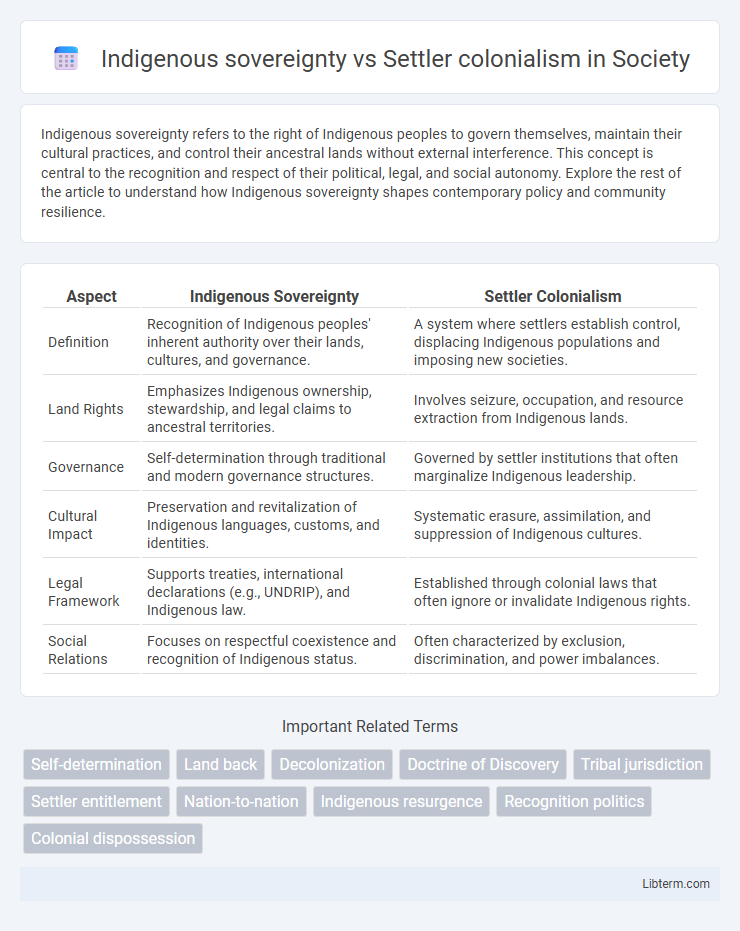Indigenous sovereignty refers to the right of Indigenous peoples to govern themselves, maintain their cultural practices, and control their ancestral lands without external interference. This concept is central to the recognition and respect of their political, legal, and social autonomy. Explore the rest of the article to understand how Indigenous sovereignty shapes contemporary policy and community resilience.
Table of Comparison
| Aspect | Indigenous Sovereignty | Settler Colonialism |
|---|---|---|
| Definition | Recognition of Indigenous peoples' inherent authority over their lands, cultures, and governance. | A system where settlers establish control, displacing Indigenous populations and imposing new societies. |
| Land Rights | Emphasizes Indigenous ownership, stewardship, and legal claims to ancestral territories. | Involves seizure, occupation, and resource extraction from Indigenous lands. |
| Governance | Self-determination through traditional and modern governance structures. | Governed by settler institutions that often marginalize Indigenous leadership. |
| Cultural Impact | Preservation and revitalization of Indigenous languages, customs, and identities. | Systematic erasure, assimilation, and suppression of Indigenous cultures. |
| Legal Framework | Supports treaties, international declarations (e.g., UNDRIP), and Indigenous law. | Established through colonial laws that often ignore or invalidate Indigenous rights. |
| Social Relations | Focuses on respectful coexistence and recognition of Indigenous status. | Often characterized by exclusion, discrimination, and power imbalances. |
Defining Indigenous Sovereignty
Indigenous sovereignty refers to the inherent authority of Indigenous peoples to govern themselves, maintain their cultural practices, and manage their lands and resources according to traditional laws and customs. This sovereignty is rooted in historical occupation, distinct political systems, and uninterrupted cultural continuity, contrasting with settler colonialism's imposition of foreign legal and political frameworks. Defining Indigenous sovereignty involves recognizing these intrinsic rights and resisting the erasure caused by colonial structures, affirming Indigenous peoples' self-determination and nationhood.
Understanding Settler Colonialism
Settler colonialism is a distinct form of colonialism where settlers permanently occupy and assert control over Indigenous lands, aiming to erase Indigenous sovereignty and replace native populations with a new society. This process involves systematic displacement, dispossession, and cultural assimilation of Indigenous peoples, severely undermining their political and territorial rights. Understanding settler colonialism requires recognizing its ongoing impacts on Indigenous self-determination and the persistent resistance efforts to reclaim sovereignty.
Historical Context of Colonization
Indigenous sovereignty has been consistently undermined by settler colonialism, a process rooted in the historical context of colonization that involved the displacement and marginalization of Native peoples. The colonization era imposed foreign governance systems and laws that eroded Indigenous political structures and land rights. This enduring legacy continues to impact Indigenous communities' efforts to reclaim self-determination and preserve their cultural heritage.
Land, Territory, and Dispossession
Indigenous sovereignty centers on the inherent rights of Indigenous peoples to govern their traditional lands and territories, emphasizing legal and cultural recognition against the ongoing impacts of settler colonialism. Settler colonialism enforces dispossession through systemic land seizures, resource extraction, and legal frameworks that invalidate Indigenous land claims, perpetuating cycles of displacement and marginalization. The conflict between Indigenous sovereignty and settler colonialism remains pivotal in struggles for land restitution, self-determination, and the decolonization of territorial governance.
Legal Frameworks and Treaty Rights
Indigenous sovereignty is grounded in inherent rights recognized by international law, including the United Nations Declaration on the Rights of Indigenous Peoples (UNDRIP), while settler colonialism promotes legal frameworks that often undermine these rights through imposed national legislation. Treaty rights, established through historic agreements between Indigenous nations and settler states, remain legally binding but are frequently contested in courts, highlighting tensions between Indigenous self-determination and state sovereignty. The legal recognition of Indigenous treaty rights varies significantly across jurisdictions, influencing resource governance, land claims, and cultural preservation.
Cultural Survival and Identity
Indigenous sovereignty is crucial for the preservation of cultural survival and identity, enabling Indigenous peoples to maintain traditional governance, languages, and customs in the face of settler colonialism. Settler colonialism imposes structures that undermine Indigenous worldviews, disrupt social systems, and enforce assimilation policies that threaten cultural continuity. Protecting Indigenous sovereignty ensures the resilience of cultural knowledge, spiritual practices, and community cohesion essential for Indigenous identity.
Resistance Movements and Activism
Indigenous sovereignty movements emphasize the inherent rights of Native nations to self-governance, land stewardship, and cultural preservation in opposition to settler colonialism's displacement and assimilation policies. Resistance movements such as the American Indian Movement (AIM) and Idle No More utilize protests, legal battles, and grassroots activism to challenge systemic injustice and assert Indigenous land claims. These activism efforts are crucial in promoting Indigenous legal frameworks and restoring autonomy against ongoing settler colonial state structures.
Reconciliation and Decolonization Efforts
Indigenous sovereignty asserts the inherent rights of Indigenous peoples to self-governance and land stewardship, challenging the structures imposed by settler colonialism that prioritize state control and resource extraction. Reconciliation efforts aim to address historical injustices through truth-telling, reparations, and recognizing Indigenous legal systems, while decolonization requires dismantling colonial institutions and restoring Indigenous epistemologies and governance. Successful initiatives include land back movements, legal recognition of Indigenous territories, and co-management agreements that affirm Indigenous authority and promote cultural resurgence.
Contemporary Challenges to Indigenous Sovereignty
Contemporary challenges to Indigenous sovereignty stem from settler colonialism's persistent legal and political frameworks that undermine Indigenous self-determination. Ongoing disputes over land rights, resource extraction, and jurisdictional authority highlight systemic barriers faced by Indigenous nations in asserting autonomy. Environmental degradation caused by industrial projects further threatens Indigenous stewardship of ancestral territories, complicating efforts to maintain cultural and political sovereignty.
Paths Toward Restoring Indigenous Autonomy
Restoring Indigenous autonomy requires recognizing Indigenous sovereignty as inherent and non-negotiable, rooted in pre-colonial governance systems and cultural practices. Effective paths include legal reforms that honor treaty rights, land restitution initiatives, and supporting Indigenous-led governance structures that resist settler colonial frameworks. Empowering Indigenous communities through education, resource control, and political representation strengthens self-determination and counters the ongoing impacts of settler colonialism.
Indigenous sovereignty Infographic

 libterm.com
libterm.com